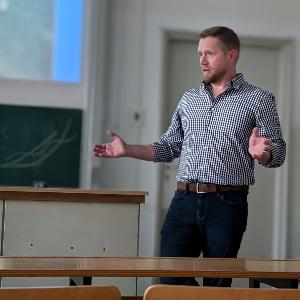Lunchtime Colloquium with Prof. Scott Ketcheson
20 Nov 2024
Exploring the effects of oil sand mining on Alberta's ecology
20 Nov 2024
Exploring the effects of oil sand mining on Alberta's ecology

© Linda Wagner
If you zoom in on a map of Alberta, Canada—particularly around Fort McMurray—you’ll notice strange linear patterns cutting through the forest. These are seismic lines, remnants of decades-old oil sand exploration where machinery carved wide paths through dense woodlands.
The idea: These paths would naturally regenerate once no longer needed. The reality: Compacted soil has left them barren, impacting the local ecosystem in unexpected ways. Seismic lines are only one example of how mining for oil sands has impacted the region’s ecology.
At our latest lunchtime colloquium, Professor Scott Ketcheson from Athabasca University shed light on the ecological legacy of Alberta’s oil sands. There are 3 main structures, impacting the fragile ecology of the region:
But there is hope: Oil companies are making strides in re-naturing shut-down mines. While it is unlikely that the original wetland ecology will return, efforts to reforest and reintroduce peatlands are creating functioning ecosystems. These reclamation projects are a step toward a more balanced future for Alberta's landscapes.
Next up at the Lunchtime Colloquium (November 27, 13-14:00) is our team member Kevser Cetin: She will present her research on "Climate change impacts on crop yields in Bavaria: past trends, future water demand, and adaptation strategies". We highly encourage students to attend and explore the agricultural aspect of our nexus research!
The Colloquia are a fantastic opportunity for students to gain first-hand and easily digestable insights into diverse research fields at the Department of Geography.